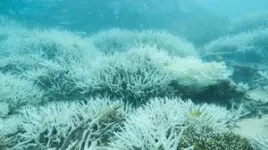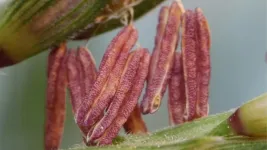(Press-News.org) The Great Barrier Reef is under critical pressure, with warming sea temperatures and mass coral bleaching events threatening to destroy the remarkable ecology, biodiversity, and beauty of the world’s largest coral reef, according to new research published today.
‘Highest ocean heat in four centuries places Great Barrier Reef in danger’, published in Nature (8 August), led by University of Wollongong (UOW) Honorary Fellow and University of Melbourne Lecturer Dr Benjamin Henley, provides new evidence of the impact that rising sea surface temperatures have had, and will continue to have, on Australia’s ecological jewel.
The research reconstructs 400 years of summer sea surface temperatures in the Coral Sea. The results chronicle extreme recent ocean heat that has led to mass coral bleaching on the Great Barrier Reef.
Last week, UNESCO’s World Heritage Committee handed down its final decision on the state of the Great Barrier Reef, declining to list the Reef as in danger. However, the scientists have pushed back and say, based on their new evidence, the Great Barrier Reef is absolutely in danger.
Dr Henley and his team combined sea surface temperature reconstructions using geochemical data from coral cores previously collected from the region. They also analysed climate model simulations of sea surface temperatures run with and without climate change, finding that human-caused climate change is to blame for the rising temperatures in the region.
The recent mass bleaching events coincide with five of the six hottest years in the new 400-year-long record. In the years 2024, 2017 and 2020, the Coral Sea reached 400-year highs, with 2024 being the warmest on record by a large margin. The recent heat events in 2016, 2004, and 2022, were the next warmest three years on record. The impact on the Great Barrier Reef’s unparalleled ecology and biodiversity over repeated sequences of mass coral bleaching is devastating.
“When I plotted the 2024 data point, I had to triple check my calculations – it was off the charts – far above the previous record high in 2017. I could almost not believe it. Tragically, mass coral bleaching has occurred yet again this year,” Dr Henley said.
“In the absence of rapid, coordinated and ambitious global action to combat climate change, we will likely witness the demise of one of Earth’s most spectacular natural wonders.
“When you compile all of the evidence we have, it’s the inevitability of the impacts on the reef in the coming years that really gets to me.”
Professor Helen McGregor, from UOW’s Environmental Futures, who is the second author of the study, said urgent action is needed to prevent devastation of one of the world’s most important ecosystems.
“There is no ‘if, but or maybe’—the ocean temperatures during these bleaching events are unprecedented in the past four centuries.
“The Great Barrier Reef is facing catastrophe if anthropogenic climate change is not immediately addressed. The very corals that have lived for hundreds of years and that gave us the data for our study are themselves under serious threat,” Professor McGregor said.
“Our climate model analysis confirms that human influence on the climate system is responsible for the rapid warming in recent decades,” said Dr Henley, who undertook most of the study as a post-doctoral researcher at UOW, where he is now an Honorary Fellow.
“Without urgent intervention, our iconic Great Barrier Reef is at risk of near-annual bleaching from high ocean temperatures. The Reef’s fundamental ecological integrity and outstanding universal value are at stake.
“We have many of the key solutions to stop climate change; what we need is a step change in the level of coordinated national and international action to transition to net zero.
“We can never lose hope. Every fraction of a degree of warming we avoid will lead to a better future for the human and natural systems of our planet.
“We hope that our study equips policymakers with more evidence to pursue deeper cuts in greenhouse gas emissions internationally.”
Coral bleaching occurs when stress causes the corals to expel the algae that live in their tissue. The algae give corals their vibrant colours and without them the coral’s white skeleton is exposed. Stress from environmental disturbances and declining water quality can lead to bleaching, but recent warming in sea temperatures has led to bleaching on a mass scale. Corals can recover from bleaching events if the stress trigger, such as extreme ocean warming, is reduced for a significant period. The reef has experienced five major mass coral bleaching events since 2016.
While the Great Barrier Reef is the world’s largest coral reef system, the groundbreaking research has implications for coral reef systems throughout the world, highlighting the link between the long-term trajectory of extreme ocean temperatures and the ecological health and biodiversity of these complex and crucial ecosystems.
Researchers from Securing Antarctic’s Environmental Future, UOW, University of Melbourne, The University of Queensland, the Australian Institute of Marine Science, Tulane University (USA), and Columbia University (USA) contributed to the paper.
UOW is committed to addressing the United Nations Sustainable Development Goals, which provide a shared blueprint to achieve a better and more sustainable future for everyone. These projects address Goal 13, Climate Action; and Goal 14, Life Below Water.
‘Highest ocean heat in four centuries places Great Barrier Reef in danger’ is published in Nature. https://www.nature.com/articles/s41586-024-07672-x
END
New 400-year temperature record shows Great Barrier Reef is facing catastrophic damage, researchers warn
Sea surface temperatures have reached critical levels for mass coral bleaching
2024-08-07
ELSE PRESS RELEASES FROM THIS DATE:
Corn’s ‘missing link’
2024-08-07
Cold Spring Harbor Laboratory (CSHL) has begun to unravel a mystery millennia in the making. Our story begins 9,000 years ago. It was then that maize was first domesticated in the Mexican lowlands. Some 5,000 years later, the crop crossed with a species from the Mexican highlands called teosinte mexicana. This resulted in cold adaptability. From here, corn spread across the continent, giving rise to the vegetable that is now such a big part of our diets. But how did it adapt so quickly? What biological mechanisms allowed the highland crop’s traits to take hold? Today, a potential answer emerges.
CSHL Professor and HHMI Investigator Rob Martienssen had ...
Scientists uncover hidden forces causing continents to rise
2024-08-07
Scientists at the University of Southampton have answered one of the most puzzling questions in plate tectonics: how and why ‘stable’ parts of continents gradually rise to form some of the planet’s greatest topographic features.
They have found that when tectonic plates break apart, powerful waves are triggered deep within the Earth that can cause continental surfaces to rise by over a kilometre.
Their findings help resolve a long-standing mystery about the dynamic forces that shape and connect some of the Earth’s most ...
Variability in constituents of e-cigarette products containing nicotine analogues
2024-08-07
About The Study: Discrepancies were observed between labeled and measured concentrations of nicotine analogues in e-cigarettes and e-cigarette liquids marketed as nicotine replacements and exempt from FDA’s regulatory purview. Such discrepancies may lead to uncertainty about user exposure. When coupled with the largely unknown acute and chronic inhalation hazards and addictive potential of nicotine analogues, assessing product risk based on exposure becomes challenging from a clinical and regulatory standpoint. With e-cigarettes increasingly considered for smoking cessation, the advent of nicotine analogue–containing products with ...
A vaping cessation text message program for adolescent e-cigarette users
2024-08-07
About The Study: A tailored, interactive text message intervention increased self-reported vaping cessation rates among adolescents recruited via social media channels.
Quote from corresponding author Amanda L. Graham, PhD:
“Health care providers, teachers, and parents have been asking how to help teens quit vaping. This study is a critical breakthrough that demonstrates the power of a behavioral intervention for vaping cessation. Text messages serve as powerful reminders of an initial commitment to quit and can deliver proven behavior change support right to a young person’s phone.
“We also did not see evidence that teens who quit ...
Neighborhood socioeconomic disadvantage across the life course and premature mortality
2024-08-07
About The Study: Low neighborhood socioeconomic status was associated with premature mortality in this study. The risk of premature mortality was greatest among individuals experiencing persistently low neighborhood socioeconomic status from young to middle adulthood. Place-based interventions that target neighborhood social determinants of health should be designed from a life course perspective that accounts for early-life socioeconomic inequality.
Corresponding Author: To contact the corresponding author, Wayne R. Lawrence, DrPH, email wayne.lawrence@nih.gov.
To access the embargoed ...
Cocaine discovery could pave way for treatment for substance abuse
2024-08-07
You have probably heard of dopamine. The substance also known as the “feel-good hormone”.
Drugs such as cocaine cause a surge of dopamine in the brain. Normally, a protein in the brain called the dopamine transporter (DAT) helps regulate dopamine levels and prevent the brain from thinking that every experience is pleasurable.
However, when affected by cocaine, the brain is unable to regulate dopamine levels. Previously, researchers did not know how cocaine affects the different transporters in the brain, but a new study from the University of Copenhagen has changed that.
“We have learned how cocaine binds to the dopamine transporter, which is ...
Link discovered between sensory neurons and breast cancer metastasis
2024-08-07
Cancer doesn’t grow in a vacuum—each tumor grows in a particular microenvironment within the body and spreads through a tangled web of vasculature and nerves. Scientists have come to understand that the most potent therapies address cancer in context—accounting for both the tumor and the support structure that forms around it.
Now, a new paper in Nature reveals that the activation of sensory nerves within breast tumors is playing a critical role in promoting not only cancer growth but also its spread, known as metastasis. The findings—that sensory neurons ...
Plants show surprising diversity in arid landscape
2024-08-07
Understanding how plants cope with climatic extremes and grazing pressure is important for reliable prediction about future biodiversity and the functioning of dryland ecosystems[1].
An international team, coordinated by KAUST’s Fernando Maestre, has assessed how 20 chemical and morphological plant functional traits jointly respond to changes in aridity and grazing pressure across global drylands. Increasing aridity and grazing pressure could be expected to reduce the level of plant diversity. However, the diversity of plant traits — including key traits linked to nutrient cycling such as specific leaf area and foliar ...
Plasma bubbles and the “engine” of fast radio bursts
2024-08-07
Rome, 7 August 2024 -- Fast Radio Bursts (FRBs) are one of the most recent open mysteries of modern astrophysics. Within a few milliseconds, these powerful events release an immense amount of energy, among the highest observable in cosmic phenomena. FRBs were discovered just over ten years ago and mostly arise from extragalactic sources. Their origin, however, is still uncertain and there are huge ongoing efforts by the astrophysics community around the world to understand the physical processes behind them.
In very few cases, the rapid flash that characterises FRBs coincides with a persistent ...
Microbes and their interactions the focus of major international meeting
2024-08-07
One of the academic world’s largest international meetings addressing topics in microbial ecology, the 19th International Symposium on Microbial Ecology (ISME), will take place in Cape Town, South Africa in August.
More than 1 500 scientists from over 50 countries worldwide will convene at the Cape Town International Convention Centre (CT-ICC) from 18 to 23 August 2024. This will be the first time that this prestigious meeting is held on the African continent.
Prof. Thulani Makhalanyane, chair of the ISME organising committee and professor of microbiology at Stellenbosch University (SU), ...
LAST 30 PRESS RELEASES:
New knowledge on heritability paves the way for better treatment of people with chronic inflammatory bowel disease
Under the Lens: Microbiologists Nicola Holden and Gil Domingue weigh in on the raw milk debate
Science reveals why you can’t resist a snack – even when you’re full
Kidney cancer study finds belzutifan plus pembrolizumab post-surgery helps patients at high risk for relapse stay cancer-free longer
Alkali cation effects in electrochemical carbon dioxide reduction
Test platforms for charging wireless cars now fit on a bench
$3 million NIH grant funds national study of Medicare Advantage’s benefit expansion into social supports
Amplified Sciences achieves CAP accreditation for cutting-edge diagnostic lab
Fred Hutch announces 12 recipients of the annual Harold M. Weintraub Graduate Student Award
Native forest litter helps rebuild soil life in post-mining landscapes
Mountain soils in arid regions may emit more greenhouse gas as climate shifts, new study finds
Pairing biochar with other soil amendments could unlock stronger gains in soil health
Why do we get a skip in our step when we’re happy? Thank dopamine
UC Irvine scientists uncover cellular mechanism behind muscle repair
Platform to map living brain noninvasively takes next big step
Stress-testing the Cascadia Subduction Zone reveals variability that could impact how earthquakes spread
We may be underestimating the true carbon cost of northern wildfires
Blood test predicts which bladder cancer patients may safely skip surgery
Kennesaw State's Vijay Anand honored as National Academy of Inventors Senior Member
Recovery from whaling reveals the role of age in Humpback reproduction
Can the canny tick help prevent disease like MS and cancer?
Newcomer children show lower rates of emergency department use for non‑urgent conditions, study finds
Cognitive and neuropsychiatric function in former American football players
From trash to climate tech: rubber gloves find new life as carbon capturers materials
A step towards needed treatments for hantaviruses in new molecular map
Boys are more motivated, while girls are more compassionate?
Study identifies opposing roles for IL6 and IL6R in long-term mortality
AI accurately spots medical disorder from privacy-conscious hand images
Transient Pauli blocking for broadband ultrafast optical switching
Political polarization can spur CO2 emissions, stymie climate action
[Press-News.org] New 400-year temperature record shows Great Barrier Reef is facing catastrophic damage, researchers warnSea surface temperatures have reached critical levels for mass coral bleaching







